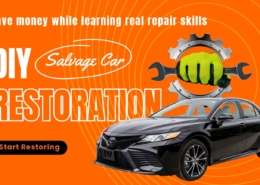 https://auction.ridesafely.com/images/2025/10/diy-salvage-car-restoration-save-money-skills-banner.jpg
865
1440
RideSafely
/images/2025/01/ridesafely-logo.svg
RideSafely2025-10-03 13:53:192025-10-03 16:36:26How to Save Thousands Restoring Salvage Cars Yourself
https://auction.ridesafely.com/images/2025/10/diy-salvage-car-restoration-save-money-skills-banner.jpg
865
1440
RideSafely
/images/2025/01/ridesafely-logo.svg
RideSafely2025-10-03 13:53:192025-10-03 16:36:26How to Save Thousands Restoring Salvage Cars YourselfOwning a car is pretty much essential nowadays; particularly in cities where good public transport system isn’t always available. However, not everyone can afford the price tag of a brand new vehicle or even a decent used one. For them, a salvage car is the only viable option. For a vehicle to be considered salvage, the total cost of repairs should outweigh its overall value. So when buying a salvage car, you should know what to expect. Here are a few things to do when buying a salvage car that will allow you to get the most out of your investment.
1. Research the Dealers
To save yourself from many headaches later, the first thing you should do is research salvage car dealers or auction. You would want to do business with honest, reputable dealerships that will provide you with a proper thorough assessment of the salvage car rather than a snake oil salesman who is just trying to score a sale. It is a good practice to ask in online forums and check reviews about the dealerships. Also, check with the Better Business Bureau for any records of past complaints. Once you have found the right dealer, it’s time to consider the next step.
2. Come Along with a Mechanic
Even if you are a ‘car guy’, there could be a lot you might not know, and thus would be unable to assess the extent of damages needing repairs. Not all cars written off as salvage are victims of accidents. In some U.S. states, flood and fire damaged vehicles can also be listed as salvage. Accurately assessing the damages on such cars can be tricky.
When buying a salvage car, it is better to bring along a trustworthy mechanic who can make a thorough and critical inspection of the vehicle. Not only will they help you gauge the proper extent of repairs needed but also help you negotiate a better price deal. Just be considerate enough to compensate them or buy them a drink afterwards for the time they gave you.
3. Don’t be Afraid to Obtain Information
While salvage cars are way cheaper than brand new ones, the price you pay is still a considerable sum, and you should strive to acquire the best value for money. Obtain as much information as possible about the vehicle’s history, whether the car is a theft recovery, about its registration, and why exactly an insurance company considered it salvage. If the car is relatively brand new, ask the dealer exactly why an insurance company wrote it off as a salvage title.
Also, it doesn’t hurt to do some detective work yourself to make sure that the salvage car being sold is authentic. Using the car’s Vehicle Identification Number (VIN), check with the National Insurance Crime Bureau to check whether the car is a salvage title or a stolen (but not recovered) vehicle. Once you have obtained the facts, you are in a far better position to negotiate the right deal.
4. Go for a Theft Recovery Vehicle
If you want the best value for money, consider a theft recovery vehicle. Since the timeframe for an insurance company to write off a stolen vehicle is between 21 to 30 days, these recovered cars are usually in good condition. Still, there is a possibility that such cars would have a lot of their parts stripped off. Nonetheless, compared to other salvage cars, they will usually incur fewer costs in repairs.
5. Consider Your Situation
Consider your unique situation. Are you after a car you would be driving yourself, or are you looking to resell it for profit? A refurbished vehicle will grant you more convenience as you would have to do little repairs to make it roadworthy. However, if your aim is to resell the vehicle, it would be better to buy a non-refurbished car and do the repairs yourself as it would end up costing you way lesser. Additionally, since older cars can be potentially cheaper to repair and buy, they are generally a better purchase option for reselling.
If you are buying the car just for its parts, carefully assess the extent of damage they may have acquired. For such purpose, it may be better to buy a newer wrecked car (but with parts you want still in good condition) than an older model with all the components worn out.
6. Talk to the Insurance Company Ahead of Time
Find an insurance company willing enough to insure your salvage would probably be your biggest challenge. With that in mind, it wouldn’t hurt to talk to an insurance provider about coverage as you browse potential purchases.
7. Take Other Costs into Consideration
Apart from just repairs on your salvage car, you will also have to take into consideration the cost of registration and insurance. The insurance costs would likely be higher for your salvage car compared to other types of vehicles. Furthermore, most car insurance providers won’t be willing to pay more than 80% of the car’s listed value.
8. Do the Math
Ideally, a salvage car commands no more than 60% of the market price of its clean title counterpart. Of course, this is for a salvage car that has been fully restored. This won’t be the case with the majority of salvage cars, and they should be available at a lower price. When buying a damaged salvage, deduct the potential costs of repairs from the 60% price figure to gauge a good estimate of its true market value.
9. Post-Purchase Inspection
Now that you have finally purchased the salvage car and done your repairs, before you can finally go driving it around town, there is one final step you must take. For your vehicle to be licensed, it must go through a post-purchase inspection. Depending on the state, it could be carried out by a licensed repair shop or would be by a police officer. In addition, there would also be some paperwork involved, where you would have to detail all the damages and repairs on the salvage auto.
Concluding Note
Apart from being far more affordable, a salvage car also feels far more personal compared to its brand new counterpart. Each salvage car has its own unique history and presents a blank canvas on which to put your creativity to use. Nothing can describe the feeling of restoring what many may consider a piece of junk into a roadworthy vehicle, just as good as any new one.
With the help of this guide, we hope you will be able to make a better-informed decision regarding the purchase of your salvage car, whether it is for your own needs or for reselling. If you have any further tips to share with us and other readers, do tell them in the comment. Share this article with your friends or family if you think the information presented here will benefit them as well.
Tweets by @RideSafely
[sr site=”tw” type=”carousel” id=”RideSafely” options=”minWidth:130,numItems:2,count:5,length:150,hideReplies:true”]






Leave a Reply
Want to join the discussion?Feel free to contribute!